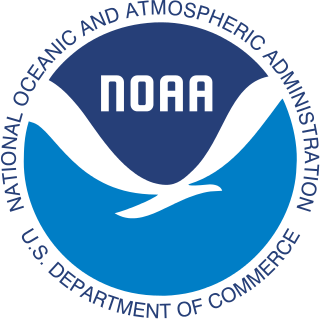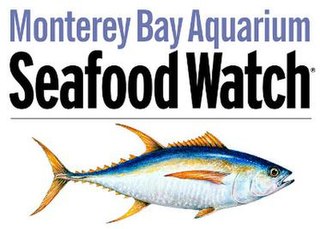
The goal of fisheries management is to produce sustainable biological, environmental and socioeconomic benefits from renewable aquatic resources. Wild fisheries are classified as renewable when the organisms of interest produce an annual biological surplus that with judicious management can be harvested without reducing future productivity. Fishery management employs activities that protect fishery resources so sustainable exploitation is possible, drawing on fisheries science and possibly including the precautionary principle.
Fisheries and Oceans Canada is a department of the Government of Canada that is responsible for developing and implementing policies and programs in support of Canada's economic, ecological and scientific interests in oceans and inland waters. Its mandate includes responsibility for the conservation and sustainable use of Canada's fisheries resources while continuing to provide safe, effective and environmentally sound marine services that are responsive to the needs of Canadians in a global economy.
The National Alliance of Vietnamese American Service Agencies (NAVASA) organization was founded and incorporation as a non-profit in 1985. Duong Hong Duc serves as chairman of the board, of 34 community-based (CBOs) and faith-based organizations (FBOs).

The Magnuson–Stevens Fishery Conservation and Management Act (MSFCMA), commonly referred to as the Magnuson–Stevens Act (MSA), is the legislation providing for the management of marine fisheries in U.S. waters. Originally enacted in 1976 to assert control of foreign fisheries that were operating within 200 nautical miles off the U.S. coast, the legislation has since been amended, in 1996 and 2007, to better address the twin problems of overfishing and overcapacity. These ecological and economic problems arose in the domestic fishing industry as it grew to fill the vacuum left by departing foreign fishing fleets.
The Northwest Atlantic Fisheries Organization (NAFO) is an intergovernmental organization with a mandate to provide scientific advice and management of fisheries in the northwestern part of the Atlantic Ocean. NAFO is headquartered in Halifax, Nova Scotia, Canada.

Oceanic and Atmospheric Research (OAR) is a division of the National Oceanic and Atmospheric Administration (NOAA). OAR is also referred to as NOAA Research.

Seafood Watch is a sustainable seafood advisory list, and has influenced similar programs around the world. It is best known for developing science-based seafood recommendations that consumers, chefs, and business professionals use to inform their seafood purchasing decisions.

Ocean Conservancy is a nonprofit environmental advocacy group based in Washington, D.C., United States. The organization seeks to promote healthy and diverse ocean ecosystems, prevent marine pollution, climate change and advocates against practices that threaten oceanic and human life.
The Fishery Resources Monitoring System (FIRMS) is a partnership of intergovernmental fisheries organizations that share information on the global monitoring and management of marine fishery resources.

Marine conservation activism is the efforts of non-governmental organizations and individuals to bring about social and political change in the area of marine conservation. Marine conservation is properly conceived as a set of management strategies for the protection and preservation of ecosystems in oceans and seas. Activists raise public awareness and support for conservation, while pushing governments and corporations to practice sound ocean management, create conservation policy, and enforce existing laws and policy through effective regulation. There are many different kinds of organizations and agencies that work toward these common goals. They all are a part of the growing movement that is ocean conservation. These organizations fight for many causes including stopping pollution, overfishing, whaling and by-catching, and supporting marine protected areas.
The International Marinelife Alliance (IMA) is a non-profit organization for marine conservation. It is based in Cox's Bazar, Bangladesh.
The South East Atlantic Fisheries Organisation (SEAFO) is an organization that maintains controls over fishing and fishing related acts in the Southeastern Atlantic Ocean.

The Coastal Conservation Association is a grassroots, non-profit, social movement organization of salt water anglers from 17 coastal states spanning the Gulf of Mexico, Atlantic, and Pacific coasts. The CCA is primarily concerned with the restoration and conservation of coastal marine resources. It operates on all three governmental tiers, those being the national, state, and local levels.

Arctic cooperation and politics are partially coordinated via the Arctic Council, composed of the eight Arctic nations: the United States, Canada, Iceland, Norway, Sweden, Finland, Russia, and Denmark with Greenland and the Faroe Islands. The dominant governmental power in Arctic policy resides within the executive offices, legislative bodies, and implementing agencies of the eight Arctic nations, and to a lesser extent other nations, such as United Kingdom, Germany, European Union and China. NGOs and academia play a large part in Arctic policy. Also important are intergovernmental bodies such as the United Nations and NATO.
A sustainability organization is (1) an organized group of people that aims to advance sustainability and/or (2) those actions of organizing something sustainably. Unlike many business organizations, sustainability organizations are not limited to implementing sustainability strategies which provide them with economic and cultural benefits attained through environmental responsibility. For sustainability organizations, sustainability can also be an end in itself without further justifications.
Blue Ventures is a social enterprise and registered charity focused on nurturing locally led marine conservation. The organisation partners with coastal communities that depend on marine resources.
The following outline is provided as an overview of and topical guide to fisheries:
Collaborative partnerships are agreements and actions made by consenting organizations to share resources to accomplish a mutual goal. Collaborative partnerships rely on participation by at least two parties who agree to share resources, such as finances, knowledge, and people. Organizations in a collaborative partnership share common goals. The essence of collaborative partnership is for all parties to mutually benefit from working together.

Western Indian Ocean Marine Science Association (WIOMSA) is a regional professional, non-governmental, non-profit, membership organization, registered in Zanzibar, Tanzania. The organization is dedicated to promoting the educational, scientific and technological development of all aspects of marine sciences throughout the region of Western Indian Ocean (Somalia, Kenya, Tanzania, Mozambique, South Africa, Comoros, Madagascar, Seychelles, Mauritius, Réunion (France)), with a view toward sustaining the use and conservation of its marine resources. The association has about 1000 individual members as well as about 50 institutional members from within and outside the region.








